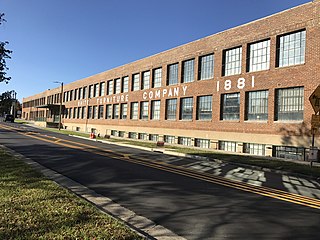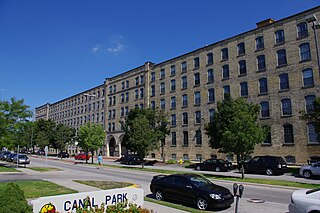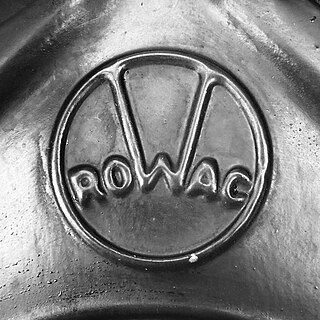
Singer Corporation is an American manufacturer of consumer sewing machines, first established as I. M. Singer & Co. in 1851 by Isaac M. Singer with New York lawyer Edward C. Clark. Best known for its sewing machines, it was renamed Singer Manufacturing Company in 1865, then the Singer Company in 1963. It is based in La Vergne, Tennessee, near Nashville. Its first large factory for mass production was built in 1863 in Elizabeth, New Jersey.

The University of Bonn, officially the Rhenish Friedrich Wilhelm University of Bonn, is a public research university located in Bonn, North Rhine-Westphalia, Germany. It was founded in its present form as the Rhein-Universität on 18 October 1818 by Frederick William III, as the linear successor of the Kurkölnische Akademie Bonn which was founded in 1777. The University of Bonn offers many undergraduate and graduate programs in a range of subjects and has 544 professors. The University of Bonn is a member of the German U15 association of major research-intensive universities in Germany and has the title of "University of Excellence" under the German Universities Excellence Initiative.

The Wiener Werkstätte, established in 1903 by the graphic designer and painter Koloman Moser, the architect Josef Hoffmann and the patron Fritz Waerndorfer, was a productive association in Vienna, Austria that brought together architects, artists, designers and artisans working in ceramics, fashion, silver, furniture and the graphic arts. The Workshop was "dedicated to the artistic production of utilitarian items in a wide range of media, including metalwork, leatherwork, bookbinding, woodworking, ceramics, postcards and graphic art, and jewelry." It is regarded as a pioneer of modern design, and its influence can be seen in later styles such as Bauhaus and Art Deco.
MillerKnoll, Inc., doing business as Herman Miller, is an American company that produces office furniture, equipment, and home furnishings. Its best known designs include the Aeron chair, Noguchi table, Marshmallow sofa, Mirra chair, and the Eames Lounge Chair. Herman Miller is also credited with the 1968 invention of the office cubicle under then-director of research Robert Propst.
The Fuller Brush Company is a company that sells branded and private label products for personal care as well as commercial and household cleaning. It was founded in 1906 by Alfred Fuller. Consolidated Foods, now Sara Lee Corporation, acquired Fuller Brush in 1968. In 1991, the company was placed in private ownership but, in 1994, it became a subsidiary of CPAC Inc., which from 2007 to 2012 was owned by the private equity group Buckingham Capital Partners. From December 2012 through Dec 2017, the Fuller Brush Company was owned and operated by David Sabin and Victory Park Capital. Since January 2018, the Fuller Brush Company has been owned and operated by Galaxy Brush LLC, located in Lakewood, New Jersey.

Ronco was an American company that manufactured and sold a variety of items and devices, most commonly those used in the kitchen. Ron Popeil founded the company in 1964, and infomercials and commercials for the company's products soon became pervasive and memorable, in part thanks to Popeil's personal sales pitches. The names "Ronco" and "Popeil" and the suffix "-O-Matic" became icons of American popular culture and were often referred to by comedians introducing fictional gadgets and As-Seen-On-TV parodies.

Faber-Castell AG is a manufacturer of pens, pencils, other office supplies and art supplies, as well as high-end writing instruments and luxury leather goods. Headquartered in Stein, Germany, it operates 14 factories and 20 sales units throughout the globe. The Faber-Castell Group employs a staff of approximately 8,000 and does business in more than 120 countries. The House of Faber-Castell is the family which founded and continues to exercise leadership within the corporation. Faber-Castell manufactures about 2 billion pencils in more than 120 different colors every year.
The Longaberger Company was an American manufacturer and distributor of handcrafted maple wood baskets and other home and lifestyle products. The company opened in 1973, was acquired in 2013 by CVSL, Inc., and closed in 2018. The following year, Xcel Brands acquired the intellectual property and relaunched the brand, expanding it to include home goods such as furniture, food, jewelry and other handcrafted products.

J. Pascal's Hardware and Furniture was a Montreal, Quebec, Canada-based chain of hardware and furniture stores.
Hansgrohe SE is a German plumbing materials and sanitary fittings manufacturer. It was founded by Hans Grohe in 1901, in Schiltach, Baden Wuerttemberg, Germany. Hansgrohe is one of the world's largest shower head, hand shower and tap suppliers, next to competitors such as Grohe and Kohler.

Friedrich Soennecken was an entrepreneur and inventor. He was the founder of Soennecken, a German office supplier.

White Furniture Company, was a major American producer of hand-crafted fine furniture for over a century (1881–1993). Founded by the White Brothers of Mebane, North Carolina, the factory notably produced furnishings for the US government and the Grove Park Inn.

Berkey and Gay Furniture Company Factory is a manufacturing plant located at 940 Monroe Ave., NW in Grand Rapids, Michigan. It was listed on the National Register of Historic Places in 2000.

Newman Brothers at The Coffin Works is a museum in the Newman Brothers Coffin Furniture Factory building in the Jewellery Quarter conservation area in Birmingham, England. The museum educates visitors about the social and industrial history of the site, which operated from 1894–1998 as a coffin furniture factory. The museum opened in October 2014 after a fifteen-year campaign by the Birmingham Conservation Trust to save the factory building, which ceased trading in 1998, and raise the funds to transform it into a heritage attraction. Located at 13–15 Fleet Street, the building is Grade II* listed.

Mother's Cookies is a food brand owned by Italian conglomerate Ferrero Group. Mother Cookies began as a bakery based in Oakland, California, that operated from 1914 to 2008. A sister company, Archway Cookies of Battle Creek, Michigan, was founded in 1936. Both Mother's Cookies and Archway declared bankruptcy in 2008. At its height, the company distributed cookies throughout the United States, and was one of the leading cookie makers in the country. The Kellogg Company acquired the Mother's Cookies trademark and recipes in December 2008 and brought the brand back to West Coast grocery store shelves on May 14, 2009.
Leo Maximilan Baginski, known as Max Baginski was a German entrepreneur, inventor and marketing specialist. He invented the „Spalt“-tablet, an analgesic bearing a characteristic split-mark. He donated the funds for building the Catholic parish church of St. Katharina in Bad Soden am Taunus, Germany.

USM Modular Furniture is a Swiss manufacturer of modular furniture for the home and office. The company’s signature product line, USM Haller, is celebrated as a design classic and included in the permanent collection of the Museum of Modern Art and the Cooper-Hewitt National Design Museum. USM Modular Furniture employs a staff of 460 throughout Europe and the United States and is represented by more than 410 sales partners in 40 countries worldwide. USM has an international presence with furniture showrooms in Bern, Berlin, Hamburg, Düsseldorf, Munich, Paris, Stuttgart, Tokyo, and New York City. The company’s New York showroom and corporate offices are located at 28 Greene Street in SoHo.
Weimar Porzellanmanufaktur, or Weimar Porzellan is a German company that has been manufacturing porcelain in Weimar since 1790.
Heritage Home Group LLC, formed to purchase most assets of the defunct Furniture Brands International, was a High Point, North Carolina-based home furnishings company. It owned the brands Broyhill, Lane, Thomasville, and Drexel Heritage.

Rowac was a hardware factory founded by Carl Robert Wagner in 1888 in Chemnitz, Germany which most notably produced furniture for industrial use. Carl Robert Wagner is regarded as the inventor of the steel stool, which among other things was chosen for the workshops and classrooms of the Bauhaus Dessau. Today, mainly stools, chairs and cabinets carrying the Rowac name are traded as antiques.













